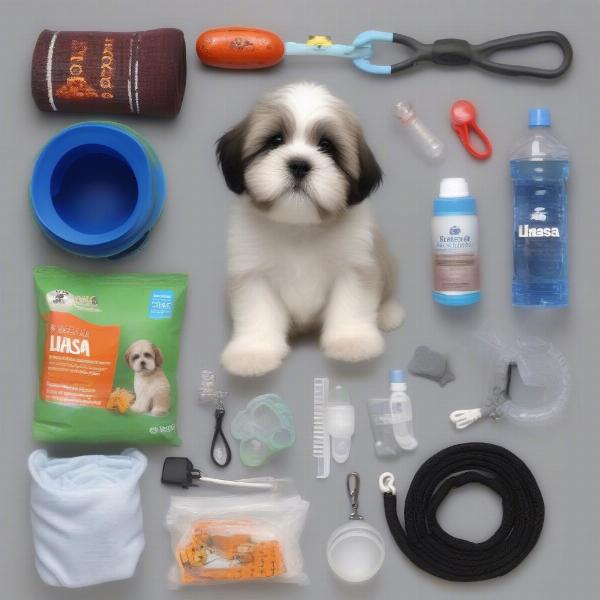Lhasa Apso dog breeders play a crucial role in preserving the breed’s unique characteristics and ensuring the health and well-being of these charming companions. Finding a responsible breeder is essential for anyone looking to welcome a Lhasa Apso into their family. This article will guide you through the process of identifying and selecting a reputable Lhasa Apso breeder, covering key aspects to consider, questions to ask, and red flags to watch out for. It will also offer advice on preparing for your new furry friend and ensuring a smooth transition into your home.
What to Look for in a Lhasa Apso Dog Breeder
Choosing the right Lhasa Apso dog breeders requires careful consideration. Responsible breeders prioritize the health and temperament of their dogs above profit. They adhere to ethical breeding practices, provide proper socialization for puppies, and are knowledgeable about the breed’s specific needs. They should be happy to answer your questions thoroughly and provide you with the necessary health clearances and pedigree information. Look for breeders who are actively involved in Lhasa Apso breed clubs and show their dogs in conformation or other performance events. This demonstrates a commitment to maintaining breed standards and overall dog well-being.
Key Questions to Ask Lhasa Apso Dog Breeders
Don’t be shy about asking potential Lhasa Apso dog breeders plenty of questions. It’s important to gather as much information as possible to ensure they align with your values and expectations. Here are some key questions to consider:
- Can I meet the puppy’s parents?
- What health tests have been performed on the parents?
- What is the typical temperament of puppies from your breeding lines?
- What is your socialization process for puppies?
- What kind of health guarantee do you offer?
- What is the average lifespan of Lhasa Apsos from your lines?
- What type of food do you recommend for Lhasa Apsos?
- Are you available for ongoing support and advice after I bring my puppy home?
Red Flags to Watch Out for
While many dedicated and ethical Lhasa Apso dog breeders exist, it’s crucial to be aware of potential red flags that might indicate less reputable practices. Avoid breeders who:
- Refuse to let you meet the puppy’s parents or visit their breeding facility.
- Offer puppies at significantly lower prices than average.
- Seem more interested in selling puppies quickly than ensuring a good match.
- Lack knowledge about the breed or provide vague answers to your questions.
- Breed multiple litters simultaneously or breed dogs too frequently.
- Sell puppies before they are adequately socialized or weaned.
- Don’t provide health clearances or pedigree information.
Preparing for Your Lhasa Apso Puppy
Once you’ve found a reputable breeder and chosen your Lhasa Apso puppy, it’s time to prepare for their arrival. Make sure your home is puppy-proofed and gather essential supplies such as food, water bowls, a bed, toys, and grooming tools. lhasa apso dog puppy discusses this topic in detail, providing valuable advice on raising a healthy and happy Lhasa Apso pup.
 Lhasa Apso puppy supplies
Lhasa Apso puppy supplies
Conclusion
Finding the right Lhasa Apso dog breeders is a significant step in welcoming a new member into your family. By conducting thorough research, asking the right questions, and being aware of potential red flags, you can ensure a positive experience and find a healthy, well-adjusted Lhasa Apso companion to share your life with. Remember that a reputable breeder will prioritize the well-being of their dogs and be a valuable resource throughout your Lhasa Apso’s life. Choosing carefully helps maintain the integrity of the breed and guarantees the happiness and health of your new furry friend.
FAQ
- How much does a Lhasa Apso puppy typically cost? Prices can vary depending on the breeder, lineage, and location, but generally range from $800 to $2,000.
- Are Lhasa Apsos good with children? Lhasa Apsos can be good with children, but early socialization and proper training are essential.
- Do Lhasa Apsos shed a lot? While Lhasa Apsos have long hair, they are considered a low-shedding breed.
- How often should I groom my Lhasa Apso? Regular grooming, including brushing and bathing, is necessary to maintain their long coat and prevent matting.
- Are Lhasa Apsos easy to train? Lhasa Apsos can be independent and stubborn, so consistent and positive reinforcement training is crucial.
- What health problems are Lhasa Apsos prone to? Some common health issues include eye problems, skin allergies, and hip dysplasia. dogs toys uk offer a variety of toys specifically designed for small breeds to ensure their entertainment and mental stimulation.
- How long do Lhasa Apsos live? The average lifespan of a Lhasa Apso is 12-15 years. small dog with long hair crossword clue and chinese lion dog informally offer other fun and engaging content related to small, long-haired breeds.
ILM Dog is a leading international online resource dedicated to providing expert advice and information on dog care and breeding. We offer valuable insights into various aspects of dog ownership, including breed selection, health, training, nutrition, grooming, and much more. From puppyhood to senior care, we’re here to help you provide the best possible life for your canine companion. Contact us for expert advice at [email protected] or +44 20-3965-8624. ILM Dog is your trusted partner in responsible dog ownership.